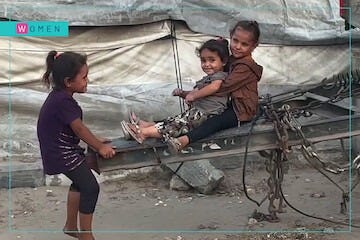When Innocence Becomes the Playground of Conflict
How the Children of Gaza Transform Explosion into Echoes of Hope
In the midst of war’s thunderous roars, children learn more than just fear—they mirror the world around them. Raziyeh Sa’adati reminds us that children absorb and reflect what they observe, and in Gaza, that reflection is both heartbreaking and heroic.
During the twelve-day Imposed War, she cared for her nieces and nephews, remaining a calming presence even when explosions and air defences shook the nearby skies. She taught them a simple rhyme:
“At dawn, as twilight falls / Fire the missile, little one calls.”
Whenever the skies roared, the children would echo the verse, chanting it together—sometimes even following up with the national anthem—until the world quieted and they could once more breathe easier.
Sa’adati stresses that children everywhere, including Gaza, have an innate, unyielding love for life—even when their streets tremble with conflict. It's as though parents across Gaza have also nurtured their children with songs to counter the echoes of violence. As explosions continue, the children's response isn’t to flinch—it’s to sing “My Homeland” at the top of their lungs, hoping that the strength of their voices might drown out the terror.
More than surviving, these children reimagine their fractured world. Play—the very essence of childhood—becomes their most serious act of defiance. They see possibility where adults see ruin—a rusted truck, heavy with metal and springs, becomes a seesaw in their hands. They view the world without filters: honest, raw, and open to transformation.
Sa’adati concludes with a reflection both poetic and stark: children see the world as it truly is—and, in their innocence, they turn diversion and play into profound statements of resilience. As the Quran states:
“The life of this world is nothing but diversion and play”
(Quran, Surah al-Ankabut, Chapter 29, The Spider, Verse 64)
and in Gaza, this diversion is true survival.


